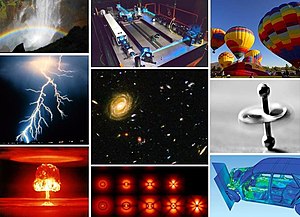
Back Fisika ACE Fisika Afrikaans Physik ALS የተፈጥሮ ሕግጋት ጥናት Amharic Fisica AN जीव-विज्ञान ANP فيزياء Arabic ܦܝܣܝܟ ARC فيزيك ARY فيزيا ARZ

Fizika (grč. φυσική (ἐπιστήμη) phusikḗ (epistḗmē) "poznavanje prirode"; φύσις, phúsis "priroda"[1][2]) je prirodna nauka koja uključuje proučavanje materije[3] i njenog kretanja kroz prostor i vrijeme, zajedno sa povezanim pojmovima kao što su energija i sila.[4] Jedna od najosnovnijih naučnih disciplina i glavni cilj fizike je shvatiti ponašanje svemira.[a][5][6][7]
Fizika je jedna od najstarijih akademskih discilina, možda i najstarija ukoliko joj se priključi i astronomija.[8] U posljednja dva milenijuma, fizika je dio prirodne filozofije zajedno sa hemijom, biologijom, i pojedinim granama matematike, ali tokom naučne revolucije u 17. stoljeću, prirodne nauke su postale sopstveni jedinstveni istraživački programi.[b] Fizika se preklapa sa mnogim interdisciplinarnim područjima istraživanja, kao što su biofizika i kvantna hemija, i granice fizike nisu strogo definisane. Nove ideje u fizici često objašnjavaju temeljne mehanizme drugih nauka[5] i time se otvaraju novi putevi istraživanjima u područjima kao što su matematika i filozofija.
Fizika pravi značajan doprinos i kroz dostignuća u tehnologiji koja proizilaze iz teorijskih otkrića. Na primjer, napredak u razumijevanju elektromagnetizma ili nuklearne fizike je direktno doveo do razvoja novih proizvoda koji su značajno transformisala društvo modernog doba, kao što si televizija, računari, kućanski aparati i nuklearna oružja;[5] napredak u termodinamici je doveo do razvoja industrijalizacije, i napreci u mehanici su inspirisali razvoj kalkulusa.
- ^ "physics". Online Etymology Dictionary.
- ^ "physic". Online Etymology Dictionary.
- ^ At the start of The Feynman Lectures on Physics, Richard Feynman offers the atomic hypothesis as the single most prolific scientific concept: "If, in some cataclysm, all [] scientific knowledge were to be destroyed [save] one sentence [...] what statement would contain the most information in the fewest words? I believe it is [...] that all things are made up of atoms – little particles that move around in perpetual motion, attracting each other when they are a little distance apart, but repelling upon being squeezed into one another ..." (Feynman, Leighton i Sands 1963, str. I-2)
- ^ "Physical science is that department of knowledge which relates to the order of nature, or, in other words, to the regular succession of events." (Maxwell 1878, str. 9)
- ^ a b c "Physics is one of the most fundamental of the sciences. Scientists of all disciplines use the ideas of physics, including chemists who study the structure of molecules, paleontologists who try to reconstruct how dinosaurs walked, and climatologists who study how human activities affect the atmosphere and oceans. Physics is also the foundation of all engineering and technology. No engineer could design a flat-screen TV, an interplanetary spacecraft, or even a better mousetrap without first understanding the basic laws of physics. (...) You will come to see physics as a towering achievement of the human intellect in its quest to understand our world and ourselves.Young i Freedman 2014, str. 1
- ^ "Physics is an experimental science. Physicists observe the phenomena of nature and try to find patterns that relate these phenomena."Young i Freedman 2014, str. 2
- ^ "Physics is the study of your world and the world and universe around you." (Holzner 2006, str. 7)
- ^ Krupp 2003
Greška kod citiranja: <ref> oznake postoje za grupu pod imenom "lower-alpha", ali nije pronađena pripadajuća <references group="lower-alpha"/> oznaka, ili zatvarajući </ref> nedostaje